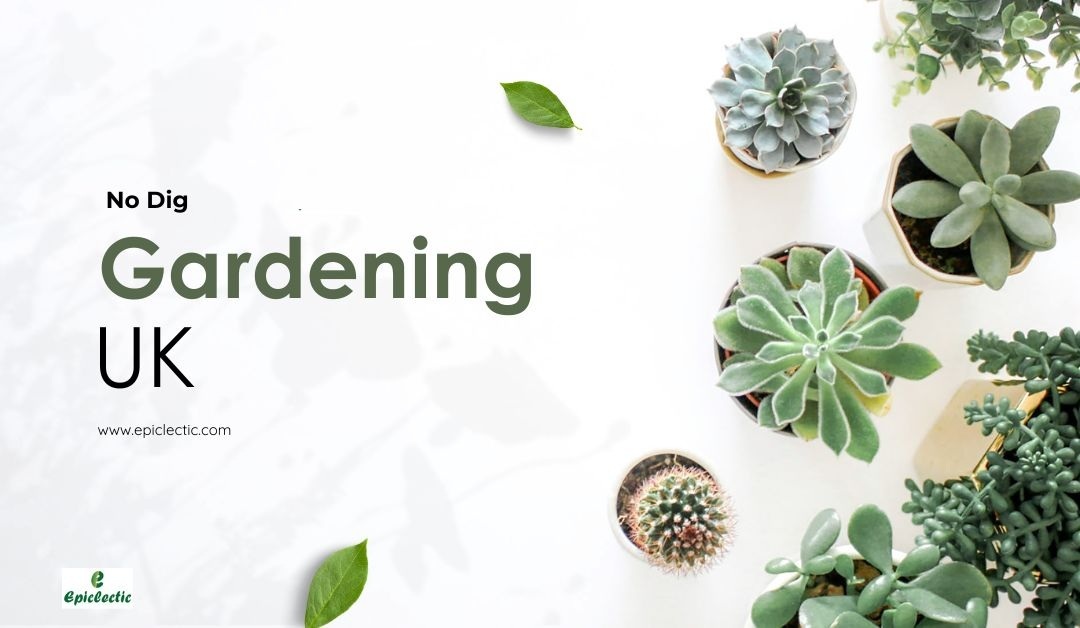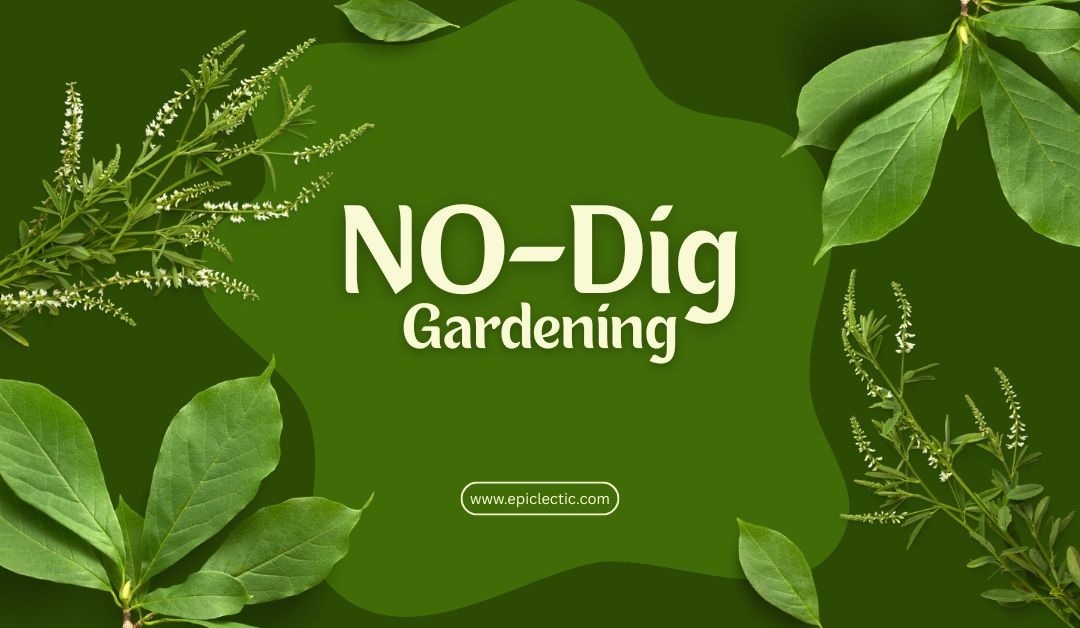You don’t need to dig deep to grow healthy plants. In fact, British gardeners are discovering that no-dig gardening UK might just be the easiest and most sustainable way to grow vegetables, herbs, and flowers — right in their back gardens or allotments.
The no-dig method is revolutionising gardening across the UK. It’s cleaner, easier, and much kinder to the soil than traditional digging. Popularised by UK gardening expert Charles Dowding, this method is ideal for anyone looking to reduce weeding, improve soil health, and work with nature rather than against it.
Whether you’re starting a garden from scratch or want to improve your allotment without back-breaking labour, this guide covers everything you need to know. From how no-dig works to setting up your first bed, we’ll walk you through it all — in plain English.
Let’s dig into no-dig — without lifting a spade!
What is No-Dig Gardening?
No-dig gardening is a natural method of growing plants without disturbing the soil through digging or tilling. Instead, compost and organic matter are added on top of the soil, allowing nature to do the work underground.
This method keeps soil structure intact, supports beneficial microorganisms, and suppresses weeds naturally. Rather than turning the soil — which can destroy its delicate balance — you build layers of organic material, creating a healthy, living soil from the top down.
No-dig gardening mimics how plants grow in nature. That same principle can be used in your garden or allotment.
The result? Fewer weeds, richer soil, and stronger, more productive plants — all with far less effort than traditional digging. It’s simple, science-backed, and suited perfectly to UK gardens.
How does the no-dig method work?
The no-dig method works by layering compost and mulch on top of existing soil, allowing worms and microbes to break it down naturally.
Here’s a simple breakdown of the process:
- First, you lay cardboard or newspaper to suppress weeds.
- Then you add a thick layer of compost — at least 5–10 cm.
- Over time, the compost feeds the soil life, which improves structure and fertility.
The beauty is in the biology. Earthworms mix the layers for you, improving aeration and drainage while boosting nutrient availability. There’s no need for turning the soil or using chemicals. You simply plant directly into the compost layer.
This method is especially useful in wet UK climates, where digging can compact the soil and make things worse. With no-dig, your garden stays light, fluffy, and fertile — naturally.
Who pioneered no-dig gardening in the UK?
Charles Dowding is widely recognised as the pioneer of no-dig gardening in the UK.
A former organic farmer turned author and teacher, Dowding has been refining and promoting the no-dig method for over 40 years. His garden in Somerset has become a real-world showcase of how this method works — producing bountiful harvests year after year without digging.
He’s appeared on BBC Gardeners’ World, written several books on no-dig principles, and runs courses both online and in person. His method is backed by side-by-side trials comparing dug and undug beds — showing better results in no-dig every time.
Thousands of UK gardeners credit his work for transforming how they approach soil, sustainability, and success in the garden.
No-dig gardening is a low-maintenance, eco-friendly method where compost is layered on top of the soil instead of digging. It improves soil health, reduces weeds, and supports natural soil life. Popular in the UK thanks to Charles Dowding, it’s ideal for gardens and allotments alike — with less effort and better results
Why is No-Dig Gardening Gaining Popularity in the UK?
No-dig gardening is growing in popularity across the UK because it’s easier, eco-friendly, and perfect for British weather and soil conditions.
Gardeners in the UK are turning to no-dig methods because they reduce effort while boosting soil health and productivity. Digging in heavy clay or wet soil — common in the UK — often causes compaction. No-dig avoids this by building healthy soil structure from the top down, which suits our often soggy climate.
The method also appeals to time-poor gardeners and eco-conscious Brits. With fewer weeds, no back-breaking digging, and less need for chemical fertilisers, it’s a low-maintenance and sustainable choice.
Thanks to influencers like Charles Dowding, awareness has skyrocketed. His YouTube tutorials, books, and side-by-side trial beds have inspired thousands of UK gardeners to ditch the spade.
How does it suit the UK’s soil and weather conditions?
No-dig gardening works particularly well in the UK because it prevents soil compaction from frequent rain and protects the structure of clay-heavy soils.
The UK’s unpredictable weather — with its long wet spells, chilly winters, and moisture-retentive clay soils — often makes traditional digging difficult and damaging. Turning over heavy or waterlogged soil breaks down its natural structure, which leads to poor drainage and increased weed growth. No-dig gardening avoids these issues entirely.
By applying compost on top of the soil, you build surface fertility while encouraging earthworms and microbes to aerate the soil naturally. This improves drainage, boosts nutrient cycling, and helps retain structure during winter, reducing erosion.
Because the soil is left undisturbed, it functions more like a natural ecosystem. This makes no-dig ideal for UK gardens, raised beds, and allotments — even in compact urban spaces where the soil can be less forgiving.
Is it environmentally friendly and sustainable?
Yes — no-dig gardening is one of the most sustainable ways to grow food and flowers in your garden.
Instead of relying on synthetic fertilisers, pesticides, or frequent watering, no-dig gardening encourages:
- Healthy microbial life
- Biodiversity in and above the soil
- Reduced carbon emissions from digging and tilling
It also reuses green waste (like homemade compost) and prevents the release of carbon stored in the soil. Many UK gardeners are switching to this method as part of a wider effort to garden more sustainably.
With climate awareness on the rise, no-dig aligns perfectly with modern values — grow more, disturb less.
Why is No-Dig Gardening Popular in the UK?
No-dig gardening is booming in the UK because it suits our wet, compact soils, requires less effort, and supports sustainable, organic growing. It’s eco-friendly, beginner-friendly, and ideal for the unpredictable British climate.
Key Benefits of No-Dig Gardening
Why choose no-dig gardening? Because it’s easier, more productive, and better for your soil and health.
No-dig gardening offers several major benefits, especially for UK gardeners dealing with unpredictable weather and compact soil. By building up the soil instead of disturbing it, you encourage life below the surface to flourish — which leads to healthier crops and less work for you.
It’s a method that works with nature, not against it. Less weeding, better soil fertility, and improved water retention are just the beginning. Whether you’re tending to a small back garden or a full allotment plot, the no-dig method saves time while improving your harvest.
Let’s break down the key benefits in detail.
Healthier Soil, Healthier Plants.
No-dig gardening improves soil structure and microbial life, which leads to stronger, more resilient plants.
When you leave the soil undisturbed, you protect its ecosystem — including fungi, bacteria, and earthworms — all of which play a key role in feeding your plants naturally. This living soil builds fertility over time and improves plant health without the need for artificial fertilisers.
Healthy soil also suppresses disease. Gardeners across the UK report fewer pest problems and stronger crops using no-dig methods. The compost layer acts like a natural mulch, feeding the soil slowly and steadily.
In short, healthy soil equals healthier, tastier harvests — especially for vegetables like carrots, lettuces, and tomatoes.
Fewer Weeds, Less Work
No-dig gardening dramatically reduces weed growth, which means far less maintenance.
When you dig soil, you bring weed seeds to the surface where they can germinate. No-dig gardening leaves these seeds buried and undisturbed. The thick compost layer on top also blocks light, which smothers existing weeds naturally.
This means less time weeding and more time enjoying your garden. Many UK gardeners report up to 80% fewer weeds after just one season of no-dig. A light hoeing or occasional hand-pull is usually all that’s needed to stay on top of things.
So if you dread weeding — no-dig is your new best friend.
Better Water Retention and Drainage
The no-dig method helps your soil retain moisture in dry weather and drain better in wet spells.
Compost-rich soils act like a sponge — holding onto water during summer droughts while draining excess moisture during rainy periods. That’s perfect for the UK, where you can get both conditions within a single week.
Undisturbed soil has better structure, with natural channels created by worms and roots. This promotes even water flow and reduces runoff. Your garden becomes more resilient to extreme weather, meaning you’ll water less often and avoid waterlogged roots.
It’s a win-win — especially in raised beds and allotments where water control is key.
Boosts Biodiversity Above and Below Ground
No-dig supports a healthier garden ecosystem — from soil microbes to pollinators.
Because no-dig doesn’t disturb the soil, it protects the underground life that supports everything from plant roots to nutrient cycles. Above ground, the compost layer encourages insects, birds, and beneficial predators like ladybirds and hedgehogs.
This balance helps reduce pests naturally — no chemicals needed. Bees and butterflies also love the healthier flowering plants that thrive in no-dig beds.
The result is a living garden, not just a growing space — and that’s better for you, your harvest, and the planet.
No-dig gardening builds healthier soil, reduces weeds, saves water, and supports biodiversity. It’s easier, more eco-friendly, and produces stronger plants — all with less work. Perfect for UK gardens and allotments.
How to Start No-Dig Gardening in the UK
Starting a no-dig garden in the UK is simple — you build on top of the soil using compost and natural layers, without turning or digging.
If you’re new to no-dig gardening, don’t worry — you don’t need fancy tools or a huge garden. The process works just as well in a small back garden, an allotment plot, or even in raised beds. The idea is to suppress weeds, build healthy soil, and plant directly into compost.
In the UK, autumn and early spring are the best times to start, but you can begin anytime the soil isn’t frozen.
Once you’ve picked your spot, you’ll layer materials to create a fertile, weed-free growing area. Think of it like making a garden lasagna — just layer, water, and plant.
Here’s how to do it step-by-step.
Step-by-Step Guide for Beginners
To start a no-dig bed, you simply layer cardboard and compost over the soil without disturbing it. It’s a gentle, natural approach that works exceptionally well in UK gardens and allotments.
Begin by choosing your site — ideally somewhere that gets plenty of sunlight and has fairly level ground. If the area is covered with grass or weeds, you don’t need to dig them out. Just cut down any tall growth so it’s flat against the surface.
Next, lay down plain brown cardboard directly onto the ground. Avoid glossy printed boxes, as they may contain inks or coatings that aren’t garden-friendly. The cardboard acts as a weed barrier and slowly breaks down into the soil. Soak it thoroughly with water to speed up decomposition and help it stay in place.
Once your base is ready, add a layer of compost — about 5 to 10 centimetres deep. This can be homemade, shop-bought, or a combination of the two. Water the compost layer well to activate soil life and encourage microbes and worms to get to work.
Now, you’re ready to plant. Simply dig small holes into the compost and pop in your seedlings or seeds. To keep moisture in and weeds out, you can mulch around the plants using more compost, straw, or leaf mould. That’s it — no digging, no backache, and your garden is officially no-dig.
What Materials Do You Need?
You don’t need expensive equipment to start a no-dig bed — just a few simple materials and basic tools. Most of what you need can be sourced for free or cheaply, especially if you’re in the UK.
The most essential item is cardboard, which you can collect from delivery boxes, shops, or supermarkets. Make sure it’s untreated and free from plastic tape. Compost is the next key ingredient. If you have a compost bin at home, great — otherwise, you can buy good-quality compost from garden centres or local councils that offer green waste compost at low cost.
Mulch is optional but helpful. Many UK gardeners use straw, well-rotted manure, wood chips, or leaf mould to maintain soil moisture and suppress weeds around their plants. You’ll also need a watering can or hose to keep your compost layer moist, especially in the first few weeks.
Basic hand tools like a small trowel or rake will come in handy, but you won’t need heavy digging tools or a rotavator. That’s the beauty of no-dig — less gear, less effort, and a lot more growing.
Can I Use It on Allotments, Lawns, or Containers?
Yes — no-dig gardening works on almost any surface, including lawns, allotments, and raised beds.
One of the best things about the no-dig method is how adaptable it is. In the UK, many gardeners successfully use it on:
- Allotment plots — No need to dig or clear weeds beforehand
- Back lawns — Simply lay cardboard and compost directly on top
- Raised beds or containers — Fill with compost, then top up yearly
- Paved or gravel areas — Use grow bags or raised planters
You can even use no-dig principles in containers by mimicking the compost layering system and avoiding soil disruption.
Whether you’re working with clay-heavy soil or urban patios, no-dig fits your space.
To start no-dig gardening in the UK, layer cardboard and compost over your soil without digging. You can apply this method to lawns, allotments, or containers using simple, low-cost materials — and start planting straight away.
Composting for No-Dig Gardening
What kind of compost should I use for no-dig gardening in the UK?
The best compost for no-dig gardening is rich, well-rotted, and made from a mix of organic materials — ideally peat-free and UK-sourced.
Whether you buy compost or make it at home, what matters most is that it’s fully decomposed and dark, crumbly, and full of life. A blend of green waste (like grass clippings and vegetable scraps) and brown matter (like cardboard and leaves) gives the best results.
For UK gardeners, peat-free compost is strongly recommended. It’s better for the environment and widely available from local garden centres, councils, or sustainable compost suppliers.
Some gardeners also use well-rotted manure, leaf mould, or even mushroom compost to enrich the mix — especially in vegetable plots. If you’re unsure, start with a general-purpose compost labelled as organic or soil-improver grade. These are ideal for building your no-dig bed and feeding your plants naturally.
Can I make compost at home for my no-dig bed?
Yes — home composting is a great, low-cost way to support your no-dig garden and reduce household waste.
You can easily make compost at home by recycling your garden clippings, food scraps, cardboard, and even shredded paper. A typical UK compost bin or heap will break down these materials over a few months — especially if you turn it occasionally and keep it moist.
For best results, aim for a balance of:
- “Greens” – like veg peelings, coffee grounds, and grass clippings
- “Browns” – such as cardboard, dry leaves, egg boxes, and straw
Avoid adding cooked food, meat, or dairy, as these attract pests. When your compost turns dark, crumbly, and smells earthy, it’s ready to use.
Even if your garden is small, many UK councils offer kitchen compost bins or wormeries that fit compact spaces and work year-round.
How much compost do I need for a no-dig bed?
You’ll typically need about 5–10 cm of compost to create or refresh a no-dig bed each season.
For a standard 1.2m x 2.4m bed (a common UK allotment size), this means you’ll need around 3–4 full bags of compost for the initial setup. After that, a light top-up once a year is usually enough to keep the system going strong.
If you’re making compost at home, you can supplement shop-bought compost with your own to cut costs and reduce waste. Many UK gardeners even coordinate with neighbours or community gardens to share compost bins or swap materials.
Over time, the composted layers build rich, living soil that improves with each passing season — no digging required.
Use peat-free, well-rotted, organic compost — homemade or bought — to build rich, healthy soil for your no-dig garden. It’s widely available in the UK and perfect for feeding soil life.
Tools and Supplies for No-Dig Gardening
Do I need special tools or raised beds for no-dig gardening?
No — one of the biggest advantages of no-dig gardening is that it requires very few tools and no expensive raised beds.
Unlike traditional gardening that often relies on digging forks, rotavators, or soil tillers, no-dig gardening keeps things simple. You won’t need to turn the soil, so there’s no need for heavy equipment. Most gardeners in the UK find that a basic hand trowel, rake, and a watering can or hose are more than enough to maintain their beds.
Raied beds are optional, not essential. You can build no-dig beds directly on the ground, over grass, or even on paved areas. That said, raised beds can be helpful in small spaces or urban gardens, especially if you want more structure or need to manage poor drainage.
Whether you use raised beds or open ground, the method works the same — build up, not down.
Where can I buy no-dig gardening supplies in the UK?
You can find no-dig gardening supplies at most UK garden centres, DIY stores, or online retailers specialising in organic and eco gardening.
Here are some common sources:
- Compost and mulch – Available at B&Q, Wickes, Dobbies, and local council recycling centres.
- Cardboard – Reuse packaging from deliveries or ask local shops (make sure it’s chemical-free).
- Hand tools – Garden centres like RHS Wisley or online shops like Crocus, Harrod Horticultural, or Gardening Naturally.
- Raised beds (optional) – Easily ordered online or built from untreated timber, bricks, or repurposed materials.
Many UK gardeners also check community noticeboards or online groups (like Facebook Marketplace or Freecycle) for free cardboard or surplus compost. Sustainability is a big part of no-dig gardening — and reusing materials fits perfectly with its ethos.
No-dig gardening is low-tech and budget-friendly. All you need are simple hand tools, compost, cardboard, and water. Raised beds are optional, and most supplies are available at UK garden centres or online.

No-Dig Gardening vs Traditional Digging – Which is Better in the UK?
Which method is better for UK gardens — no-dig or traditional digging?
For most UK gardens and allotments, no-dig gardening offers better long-term results with less effort and more sustainability than traditional digging.
Traditional digging has long been used to loosen soil, remove weeds, and incorporate compost. But in the UK’s heavy clay soils and wet climate, it often leads to compacted beds, disrupted soil ecosystems, and extra work.
In side-by-side trials by experts like Charles Dowding, no-dig consistently delivers equal or better harvests with far less input.
Does no-dig really work for clay-heavy UK soils?
Yes — in fact, no-dig is especially effective for clay-rich or compacted UK soils.
Digging clay soil can make it clumpier and worsen drainage. No-dig avoids this entirely. By layering compost on top, you slowly create loose, crumbly soil as worms and microbes work naturally beneath the surface.
Over time, your soil improves without ever needing to be turned. Gardeners across the UK report better results from no-dig beds on even the most challenging clay plots.
Which method controls weeds better?
No-dig gardening offers better long-term weed control than digging because it doesn’t expose buried weed seeds.
When you dig, you bring dormant weed seeds to the surface, giving them light and space to grow. No-dig suppresses these by layering compost and cardboard, keeping the seed bank buried and reducing new growth.
Over time, with regular compost top-ups and light hoeing, most no-dig beds become virtually weed-free.
No-dig gardening outperforms traditional digging for most UK soils. It reduces compaction, supports soil life, controls weeds better, and requires less effort — all while producing equal or better results.
Common Mistakes to Avoid When Starting No-Dig Gardening
What mistakes should beginners avoid in no-dig gardening?
The most common mistakes in no-dig gardening include using the wrong materials, applying compost too thinly, and expecting instant results.
Many beginners use glossy cardboard, which can contain harmful chemicals — always go for plain brown cardboard with no tape or print. Another issue is applying too little compost. For effective weed suppression and soil building, you’ll need at least 5–10 cm of compost from the start.
It’s also important not to plant into raw materials like manure or uncomposted waste. Always wait until your compost is fully broken down and cool to the touch.
Finally, patience is key. No-dig gardening builds soil health gradually. Don’t expect perfect results overnight — but within one or two seasons, you’ll notice fewer weeds, healthier soil, and better yields.
No-Dig Gardening Beginner Mistakes
Use plain cardboard, apply a thick enough compost layer, avoid raw manure, and give your garden time to develop. No-dig rewards consistency and care — not shortcuts.
Real-Life No-Dig Garden Examples in the UK
Are there real UK gardens using the no-dig method successfully?
Yes — many UK gardeners, from home growers to professionals, have adopted no-dig gardening with excellent results.
Perhaps the most well-known example is Charles Dowding’s garden in Somerset, where no-dig methods have been tested side-by-side with traditional digging for over a decade. His results consistently show higher yields, fewer weeds, and healthier soil in no-dig beds — even on the same plot.
Allotment holders across the UK are also turning to no-dig. From small patios to full allotments, no-dig gardening is proving its value across the country — one compost layer at a time.
No-Dig Gardens in the UK
From Charles Dowding’s renowned trials to local allotments and urban gardens, real UK gardeners are using the no-dig method to grow more with less effort — and the results speak for themselves.
FAQ: No-Dig Gardening UK
Does no-dig gardening really work in the UK?
Yes — no-dig gardening works extremely well in the UK, especially in clay-heavy and wet soils.
It prevents compaction, improves drainage, and suits the unpredictable British climate.
How do I start a no-dig garden?
To start, lay cardboard over grass or soil, add 5–10 cm of compost, and plant directly into it.
You don’t need to dig, just build your bed on top and keep it moist.
Do I need raised beds for no-dig gardening?
No — raised beds are optional.
You can start no-dig gardening directly on the ground, lawn, or even over paving using containers or grow bags.
What compost should I use for no-dig gardening?
Use well-rotted, peat-free compost — either homemade or bought.
You can also add leaf mould, green waste compost, or mushroom compost for variety.
How much compost do I need?
You’ll need about 5–10 cm of compost to start a no-dig bed.
For a 1.2m x 2.4m bed, that’s roughly 3–4 standard compost bags.
Is no-dig gardening eco-friendly?
Absolutely — it’s one of the most sustainable gardening methods.
It saves water, avoids chemicals, stores carbon, and builds soil health naturally.
Conclusion + Getting Started with No-Dig Gardening Today
Why should I start no-dig gardening now?
No-dig gardening is the simplest, most sustainable way to grow in the UK — with fewer weeds, healthier soil, and better harvests, all with less effort.
If you’re tired of digging, weeding, or seeing poor results from compacted or tired soil, now is the perfect time to try the no-dig approach. You don’t need expensive tools or a big budget — just cardboard, compost, and a bit of patience.
Whether you’re working a full allotment or just a few raised beds, this method works with the UK’s weather, soil types, and eco-conscious lifestyle. It’s beginner-friendly, low-maintenance, and backed by proven results — from experts like Charles Dowding to everyday gardeners across the country.
Start small if you like — even one no-dig bed can show you the difference. With each passing season, your soil will improve naturally, your crops will grow stronger, and you’ll wonder why you ever bothered digging at all.
Get Started with No-Dig Gardening
No-dig gardening is easy, eco-friendly, and made for UK conditions. Start with compost, cardboard, and a bit of space — and let nature take care of the rest.




